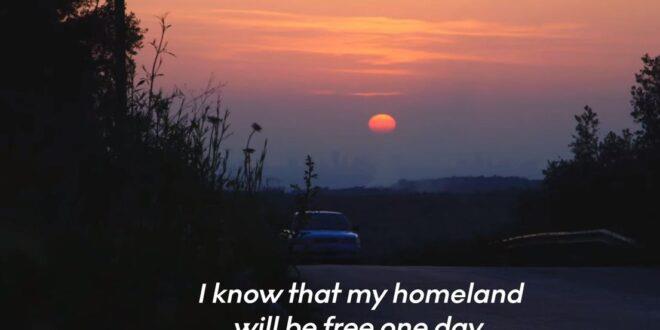
New Documentary Film Profiles Palestine's First All-Girl Hip-Hop Group And Their Mission To Empower Young Women Through Rap
568 Views
Washington, D.C. and Doha, Qatar /PNN/
A new film by Doha Debates and film cooperative Muzungu Producciones follows a popular all-girl Palestinian hip-hop collective in the West Bank, rapping about the daily struggles of living in a refugee camp in occupied Palestine and using music to empower other young women. The short documentary,“Raising Their Voice: Ettijah,” recently premiered at the Amman International Film Festival (AIFF) in July and is now available for streaming on DohaDebates.com.
The film profiles Ettijah, Palestine's first all-girl hip-hop group, which was founded in 2013 by a group of Palestinian teens, including Diala Shaheen, Dalya Ramadan, and Nadin Odeh. The young women live alongside approximately 20,000 other Palestinian refugees in the Dheisheh refugee camp, located south of Bethlehem in the West Bank.
With support from the Shoruq Organization, a Palestinian initiative that advocates for youth and art programs in the West Bank, the young women write and perform raps that address politics, social issues, life as a refugee, and the rights of women and children. Since its inception, Ettijah—which translates to“direction” in English—has exclusively featured female musicians.
Elijah member Diala Shaheen says that their best-known songs, including“Freedom,”“Expulsion” and“Watani” (or“Homeland”), address the daily difficulties of living in occupied Palestine.
“Through rap, we can make people aware of the Palestinian question,” Shaheen states in the film.“Since we have been born, we have not known what freedom is because we live under the occupation.”
“A girl or boy who lives in the refugee camp, the first rule they learn, without being taught, is that they must not be afraid,” Nadin Odeh tells filmmakers.“You should not be afraid, as there are always night attacks on the camp, arrests made by soldiers, the noise of the bullets, the weapons.”
“Raising Their Voice: Ettijah” also explores the girls' family histories and how their personal experiences shape the way they write and perform.
In the film, Nadin Odeh shares photographs of her grandmother, a witness to the Deir Yassin massacre in 1948, which took the lives of at least 100 Palestinian men, women, and children. In one photo, her grandmother holds the key to her former home in Dayr Aban, a village located near Jerusalem. Forced out during the massacre, she kept the key, not knowing she would never be able to return.“They smelled the blood of the massacre, and they grabbed their things and ran away so it wouldn't happen to them, too,” recounts Odeh.
Ettijah's performers also divulge the difficulties of being female rappers in their community, emphasizing their mission to empower other young Palestinian women to find their voices.
“There is a bad image in society about girls who rap, and about what we do,” Ramadan shares.
Shaheen states,“I think we should start with the younger generations, help them grow, just as we have grown, too.“We should give them that push, to the little girls, to live their lives in a different way—that they sing rap, they express themselves freely about what they feel and think.”
“Raising Their Voice: Ettijah” is the first film in the new short-documentary series Music for Good, a collaboration between Doha Debates and Muzungu Producciones that commissions emerging filmmakers to shoot unique local artists who use music to give voice to people worldwide. Muzungu is a film collective that for more than ten years has produced documentaries in conflict areas, including Africa, Asia, and Latin America.
Rising filmmakers Nour Abu Kamal and Tamara Abu Laban shot the film. Tamara Abu Laban was born in the Dheisheh refugee camp near Bethlehem in the occupied West Bank; she obtained her bachelor's degree in media from Cairo University and studied at the Red Sea Institute of Cinematic Arts. Born in Bethlehem, filmmaker Nour Abu Kamal has contributed to several films covering life in Palestine.“Raising Their Voice: Ettijah” was executive produced by Katrine Dermody and Japhet Weeks of Doha Debates.
Other forthcoming films in the series include short documentaries on the Brazilian Indigenous rap act Brô MC's, who sings in a mix of languages (including their endangered language, Guarani); rapper Nara P., part of Senegal's Y'en a Marre (“We're Fed Up”) social movement; and Moroccan rap artist Amine, a displaced refugee in Greece.
Muzungu Producciones is a global cooperative composed of filmmakers, journalists, photographers, and producers whose goal is to bring together different perspectives through a commitment to storytelling. They are headed by Athens-based filmmaker Elpida Nikou (who served as editor on“Raising Their Voice”) and Rodrigo Hernandez.
Doha Debates is a media organization based in Washington, D.C. which airs live debates, town halls, short films, podcasts, and other media to bridge differences, build consensus, and identify solutions to urgent global issues.
All films in the series will be available on DohaDebates.com and via Doha Debates' YouTube, Twitter, and Facebook channels.
Doha Debates unites, empowers, and inspires younger people to become impassioned, informed leaders. We are inspired by Majlis-style debates, which are designed to bridge differences, build consensus and identify solutions to urgent global issues. Through live debates and shows, podcasts, videos, educational curriculum, newsletters, other written work, social media initiatives, and more, we amplify diverse perspectives and practical solutions to humanity's challenges.
Over the past several years, Doha Debates' solutions-focused programs have reached hundreds of millions of people in 233 nations and territories.
Legal Disclaimer:
MENAFN provides the
information “as is” without warranty of any kind. We do not accept
any responsibility or liability for the accuracy, content, images,
videos, licenses, completeness, legality, or reliability of the information
contained in this article. If you have any complaints or copyright
issues related to this article, kindly contact the provider above.


















Comments
No comment